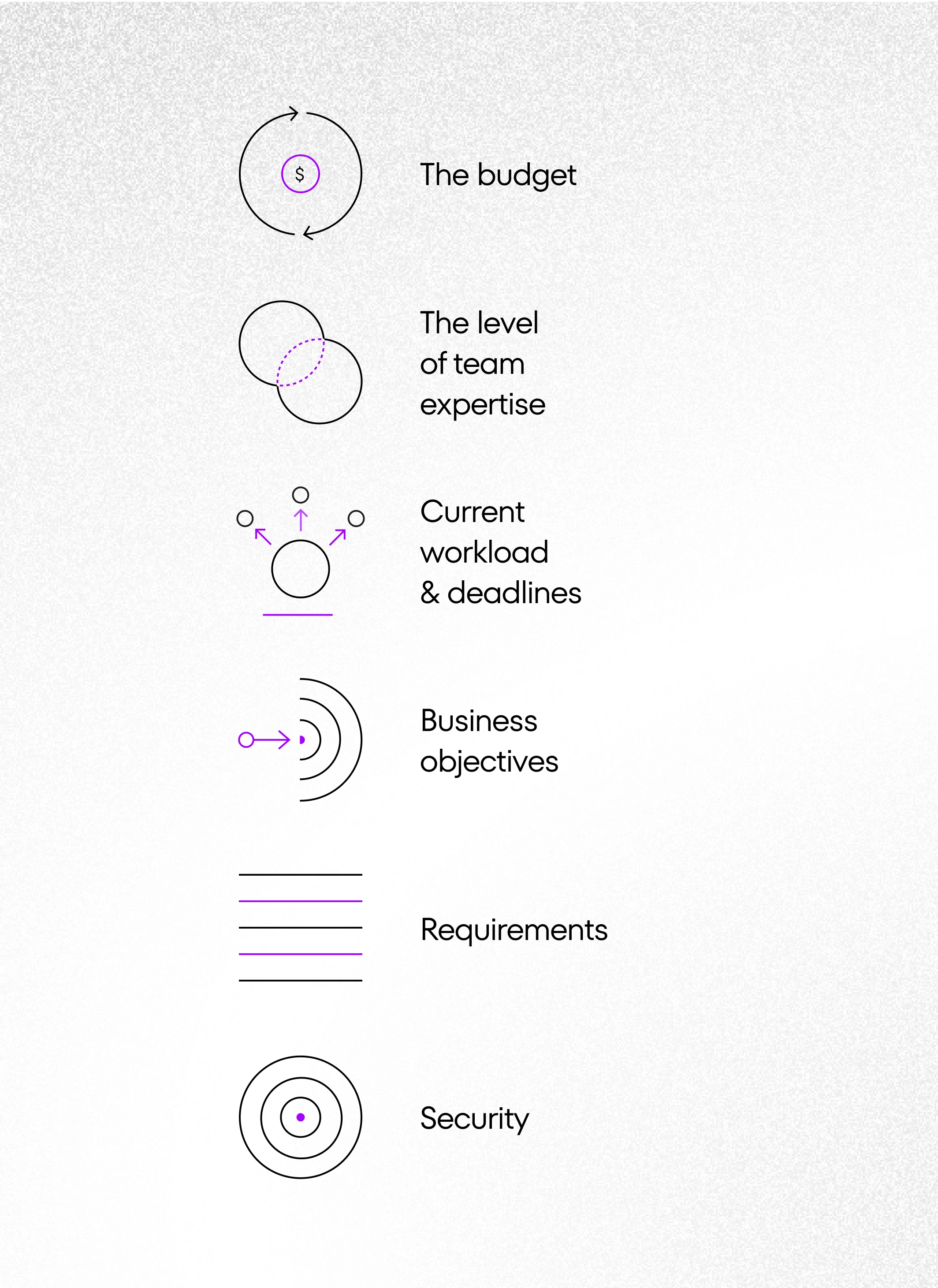August 3rd, 2021 | by Klaudia Raczek
In-house vs. Outsourcing – What's Better for Your .NET Project?

Table of contents
It may be surprising, but as a software development company offering outsourcing development services to customers globally, we are not going to try to convince you that outsourcing is the best solution in every case. Rather, we’d like to explain in which cases it is the right option, so you could feel you’re making the best choice for your next application development.
There are no universal solutions; both have their pros and cons. To decide between in-house vs. outsourcing, business owners must consider the type of the project, its scope, target culture, planned investments, and the internal situation in the company. Here are the main issues that should be taken into consideration when deciding whether to outsource your next .NET project or not.
In-house vs. outsourcing – what you need to consider
To choose between hiring an in-house or outsourced .NET development team, business owners need to consider several key company and project criteria. Before we discuss the pros and cons, take a look at them below and answer the questions to add more clarity.


- The budget: Do you have limited funding, or will you be able to splurge here and there, especially when unforeseen costs arise?
- The level of team expertise: How proficient is your team in .NET? Do you have someone in-house who could lead the team in .NET development?
- Current workload of the in-house development team and project managers: Could they do more tasks, or is it better not to approach them right now?
- Deadlines: Can you take your time, or do you have a fixed delivery date? How soon is it?
- Collaboration: does this project require maximum in-house engagement, or can it be handled by a distributed team?
- Business objectives: Can you or can you not compromise on any of them?
- Requirements: Have they been clearly defined? Or are you not sure where to start?
- Control: Do you prefer to have full control of the project, or rather have someone take care of it for you?
- Security: Can you trust an outsourcing company with data and the intellectual property you are bound to disclose to them?
When is it better to outsource?
Now that you’ve thought through the above criteria let’s look at the situations in which outsourcing your .NET project tasks to an experienced partner will bring significant benefits.
When you’re on a limited budget
Outsourcing software development is usually cheaper than building an in-house team because it offers easier access to skilled and experienced individuals, which your team members may lack. If that’s the case, you’d either have to invest in developing their skills (which will also take more time) or hire new employees, which will incur additional recruitment, hiring, equipment, and salary costs. And most IT business professionals know how difficult it may be to find the right talent today. Software development outsourcing eliminates all of these problems. If it turns out that during the project, your team must be extended, an outsourcing company will take care of scaling the team as well. If you’re operating on a tight budget and look for ways to cut expenses, outsourcing a .NET team is your best option.
When your team lacks .NET expertise
We’ve just mentioned that finding the right talent is difficult these days, especially when you’re looking to hire an in-house expert. You’ve experienced this problem, right? With outsourcing, you gain easier access to worldwide talents and freelancers, a variety of skills, and experience. .NET outsourcing companies pay great attention to training their experts and certifying their level of expertise, also in the niche domains. Agency experts typically deal with numerous and diverse projects so that they can propose unconventional solutions based on their experience. What is more, an outsourcing team will guide you regarding the best technology decision you need to make to meet the business objectives. You will pay to learn how to use technology to your advantage, not just for the talent and hours worked.
When timely delivery is key
Timeliness is one of the greatest benefits of outsourcing software development. Experienced teams have relevant workflows in place throughout the entire product development lifecycle to ensure timely delivery of each milestone. Some companies can benefit from distributed teams and work 24/7 to deliver the projects even faster! When you have a short time to market for your .NET solution, outsourcing will definitely become your asset. You will save the time you’d have to spend on recruiting and hiring the right talent. Also, if your clients are based offshore, it’s good to find an offshore outsourcing partner as they will also know that market inside out and will be able to offer maintenance and support in the time zone where your clients are based.
When you can’t compromise on any business objective
In-house teams usually spend a lot of time polishing their innovative idea, which leaves them limited time and resources on actually implementing it. By assigning the development tasks to an external outsourcing team, you can focus on the core business principles and at the same time be sure an outsourcing team will implement all of them, leaving your hands free to focus on branding, marketing, business development, or other core areas of the business. An outsourcing team will also advise one of the best technologies to use to meet the business objectives.
When your PMs and developers already have their hands full
In this scenario, you won’t have to find coding talent alone but rather build an entire in-house .NET team from scratch. Not only will this take more time, but it may affect the quality of your project as well since the team will have to take time to develop common work practices. With that, certain tasks may get out of control, which will require the team to work extra hours to fix them. The in-house team will not be available round the clock in such situations, slowing down delivery. With outsourcing, you don’t need to worry about those things and can focus on business growth.
When your project requires high flexibility
When the .NET app requirements haven’t been clearly defined, they may change at some point. In fact, this happens even when conditions have been defined. An outsourced .NET team will be able to make corrections per the business requirement much easier than an in-house team would do. If, at some point, you will decide you need to add new functionality, an outsourcing company will be able to easily add resources to meet these requirements without having to rebuild the application or rewrite the code.
When is it better to opt for an in-house team
In some cases, building an in-house team for your next .NET project will be more advantageous than hiring an outsourced team. Consider the below scenarios:
When you need to start working immediately
Choosing the right outsourcing software development company may be time-consuming, especially that you don’t want to rush this decision. There are several factors you need to consider when choosing the right outsourcing partner. In the end, the company is likely to work with you over an extended period of time, so you need to make sure they meet your criteria, are reliable and trustworthy in the long term. We covered this topic extensively in an earlier article, about 11 things to consider before outsourcing software development. If development works must start immediately, delegate it to your existing in-house team.
When strong collaboration is required
Naturally, your in-house team has a better understanding of your organization and other projects than external experts. While the latter will definitely pay great attention to understanding the requirements and specificities of the project, their engagement will always be limited compared to in-house experts. If you prioritize close collaboration, working together as a team, and building strong relationships within the team, outsourcing may not always work. In that way, you will also be able to customize the development process even to the smallest tech and business needs. In addition, your in-house team members will soon become experts in the specific field and will be able to maintain the product easily and independently in the future.
When your budget is flexible
We’re not talking about the potentially rising costs of the project itself, but additional costs related to maintaining the office and development teams. Building an in-house team will generate indirect costs, such as office space lease and its maintenance costs, purchase of equipment and amortization, salaries and benefits, and potential development of soft skills of the staff. The price of all these components usually has to be paid after a given project is finished. When you opt to outsource a dedicated development team, you don’t need to worry about any of these issues so that it may be a more convenient solution, especially for startups and small businesses.
When you’re unsure how to approach the project
A good outsourcing software development company will have enough experience to explain the best tech stack options for the business objectives you want to meet. If you know what the outcomes of the project must be but are unsure how to meet them, the partner should also guide you through the process. Startups that are looking for financing may benefit from building an MVP (either in-house or externally) instead of a full-fledged product that will definitely cost more, even when it’s outsourced. MVP development is beneficial when companies are unsure whether their idea is fine-tuned well for the market needs.
When you need centralized and controlled management and communication
One of the risks in outsourcing is losing control over the quality of process and code – if you don’t have a technical expert in-house, you won’t be able to notice all the details before the .NET solution is finished. You may also feel that you’re not on top of project management and communication. You may establish common channels and communication processes with the external team, but they are likely to have distinct principles and structures, which will impact how you cooperate. If you need to have full control over the project management process and insight into communication, opt for an in-house team.
When you’re operating on highly confidential data
Outsourcing software development means you’ll have to share your intellectual property and other confidential data with an external partner. You need to work with someone who is trustworthy and has appropriate security measures in place against cyberattacks to protect that data. You should always sign a Non-disclosure agreement at the outset of cooperation to ensure your intellectual property is protected. However, if you feel that the data you are about to disclose is too sensitive and you can’t establish a trustworthy relationship with an external partner, opt for an in-house team instead.
In-house vs. outsourcing in .NET
As we’ve explained, there are pros and cons in both .NET in-house vs. outsourcing. The advantages of outsourcing include fast delivery (often sped up by working across different time zones), lower cost, no hassle with hiring, and access to qualified talent. However, outsourcing also has its disadvantages: it takes time to pick the right partner from the multitude of outsourcing companies, you make feel you have less control over the project and communication, and external employees won’t have a thorough understanding of your business and stakeholders.
What are the benefits of an in-house team? Delegating .NET development tasks in-house will allow you to start working immediately with people who have better knowledge of your organization. Likely, it will remove the stress related to handling confidential data. At the same time, building an in-house team will be more expensive and time-consuming, so if you don’t have these resources, opt for a reliable and experienced outsourcing partner.
We place great emphasis on partnering with our customers instead of merely delivering another product for them. We hope this text has shed some light on the doubts you may have with outsourcing .NET software development.
We are fully aware of the pros & cons of outsourcing software development, so we never jump straight into coding. In the initial phase, we discuss the project requirements and your expectations and, most importantly, advise on what is possible and what isn’t in a given scenario. From our perspective, these are crucial for fruitful cooperation and building successful products. If we deem that outsourcing is not the best solution for your project, we will certainly let you know about it during the initial talk. If you’re having difficulties deciding between in-house and outsourcing, contact us directly, and we’ll be happy to discuss the pros and cons.
Read next: When .NET Framework is the Best Choice for Application Development and Why?


